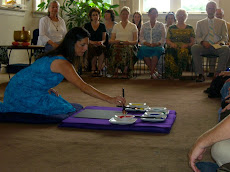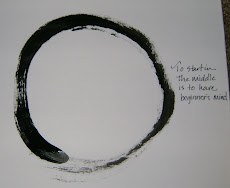I received a book by Julia Cameron from my friend, Joan, the other day. The book is called The Sound of Paper. I have Cameron's book The Artist's Way, but haven't read it for some time. In the beginning of The Sound of Paper, Cameron has a section entitled, "In Your Backpack." She emphasizes three essentials for working with the book. One of them is "Morning Pages."
"Morning Pages" are a tool Cameron has touted throughout her career. I never really took heed to them, but upon reading the reasons why this time around, I decided to give them a shot. The author writes:
Morning Pages prioritize our day. They render us present to the moment. They introduce us to an unsuspected inner strength and agility. They draw to our attention those areas of our life that need our focus. Both our weaknesses and our strengths will be greatly revealed. Problems will be exposed, and solutions suggested (Cameron, 2004, p. 2).
Cameron encourages writing three long-hand pages upon awakening. I have now utilized this practice for the past four days. I am finding that I appreciate the simple discipline of it. I also think it is helping me empty out some of what's rattling around in my brain prior to my sitting practice. Not that my brain isn't still active during shamatha, but it seems to be a little less busy.
In her book Writing Down the Bones, Natalie Goldberg explains that writing itself can be a kind of meditation practice, if utilized in that way. Currently, it feels reflective and contemplative, but not quite meditative to me. But I get what she means.
Michael, my meditation instructor, also offered up another practice. In Sakyong Mipham's Turning the Mind Into an Ally he offers eight-step instructions for Contemplative Meditation practice. It can be found in the back of the book on p. 227, Appendix C. I practiced this last night and had a good sitting practice with my breath, focusing on an intention, allowing images come up to support that intention, and then letting them go and returning to breath. It seems a good tool to use prior to sitting down with my thesis project.
Today, I listened to my body. I am worn out. I stayed home from work. I napped a lot. Practiced my inner methods. Caught up on reading I had assigned my students, but I myself hadn't gotten to, did a bit of prep, and dabbled with my thesis. Then I napped some more. And some more. A much needed day of rest.
Lizard Coloring Page
2 years ago





No comments:
Post a Comment